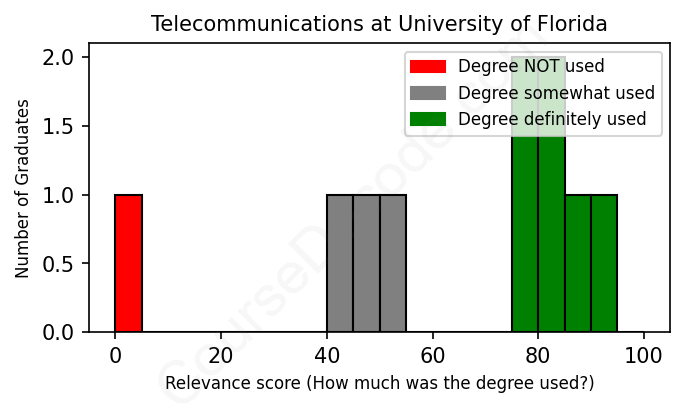
First, some facts. Of the Telecommunications graduates from University of Florida we've analyzed , here's how many have used (or NOT used) their degree in their career:

These are estimates based on AI analysis of 10 LinkedIn profiles (see below).
The verdict? Slightly below average. Overall, with an average relevance score of 64%, Telecommunications graduates from University of Florida have a slightly lower likelihood (-3%) of finding work in this field compared to the average graduate across all fields:
And for comparison, here's the chart for all profiles we've looked at across all degrees.
Also, after graduating, only 20% of these graduates have pursued further education other than another Bachelor's degree (such as a Masters degree or other), compared to the average across all profiles of 35%. This suggests a Bachelors degree is enough for most Telecommunications graduates, and it's normal to look for work straight after graduation.
See the details:
|
Relevance score: 85% We think this person has gone into a career highly relevant to their degree. We think this person has gone into a career highly relevant to their degree.
DEGREE INFOGraduated in 2015 from University of Florida with a Bachelor of Science (B.S.) in Telecommunications. No other secondary education since. JOB HISTORY SINCE GRADUATIONMultimedia Radio Broadcaster KSID Radio Jul 2016 - Jan 2020 Operations Manager/Sports Director/Play-by-Play Broadcaster  Ottumwa Radio Group Jan 2020 - Mar 2022 Freelance Broadcaster  Freelance Mar 2022 - Present ABOUT[NAME REMOVED] most recently worked for Ottumwa Radio Group located in Ottumwa, Iowa. He began working at Ottumwa Radio in January 2020 serving as the Operations Manager/Sports Director/Play-by-Play Broadcaster for six radio stations within the Group's family of stations. Taking over in this job role during a pandemic year has been both challenging and eye-opening. Being the youngest full-time employee, while simultaneously being tasked with being 'second-in-command,' is an experience [NAME REMOVED] relished and thrived in. Some of [NAME REMOVED]'s work responsibilities included overseeing a full-time staff of five in Continuity, Marketing, News, and Traffic; Ensuring each station remains FCC compliant; Gathering and reporting local/regional sports stories for listeners; Providing play-by-play in baseball, basketball, football, and volleyball for Van Buren County High School. In April 2021, [NAME REMOVED] was hired for a freelance play-by-play opportunity with the NJCAA for the postponed 2020 Division II Volleyball National Championships in Cedar Rapids, Iowa, where he was able to broadcast 17 matches via Internet streaming on the NJCAA Network. He was asked to return for the 2021 Division II National Championships the following November. Prior to his time in Ottumwa, [NAME REMOVED] first made the move to the Midwest in Summer 2016 as a MultiMedia Broadcaster/Assistant News Director at KSID Radio in Sidney, Nebraska. About a year-and-a-half later, [NAME REMOVED] took over as the full-time News Director, while also handling play-by-play duties for five area schools baseball, basketball, football, and volleyball prep sports. His biggest work accomplishments to-date include earning the Nebraska Broadcasters Association (NBA) Gold Award for Best Play-by-Play in 2017-18, then the following year winning the NBA Gold Award for Best In-Depth or Investigative Story or Series, and the Silver Award for Best In-Depth Sports Story or Series. [NAME REMOVED] graduated from the University of Florida in 2015 with his Bachelors of Science in Telecommunications. He grew up in Pensacola, Florida, before attending college in Gainesville from 2012-2015. |
The top 10 most common jobs done by the graduates we've analyzed (ranked most common to least) are:
From the analysis of LinkedIn profiles of University of Florida Telecommunications graduates, it seems like many of the common job roles they take on revolve around media production, broadcasting, and audio-visual technology, which are all closely related to their degree. Positions like Video Production Technician, Audio Visual Technician, and Multimedia Journalist reflect a clear connection to telecommunications, as they require specific skills in media, communication technologies, and content production. Even roles like Technical Lead and Operations Manager in AV companies showcase how graduates have leveraged their skills in real-world technical settings. That makes sense, as many skills learned in telecommunications directly apply to these kinds of positions.
However, it’s also interesting to note that not all roles held by graduates are directly tied to telecommunications. Jobs in marketing, operations management, and even roles in human resources often lack a crucial telecommunications component, suggesting that while these graduates might find success in various fields, their educational background isn’t always fully utilized. For instance, positions like Operations Manager at Amazon or HR Manager don't align with the core competencies related to telecommunications, indicating a divergence from the field. Overall, while graduates have often found work relevant to their degree, a significant number have ventured into roles that don’t fully leverage their specialized technical knowledge.
Here is a visual representation of the most common words in job titles for Telecommunications graduates (this is across all Telecommunications graduates we've analyzed, not just those who went to University of Florida):

Graduates from the University of Florida with a degree in Telecommunications tend to follow a variety of career paths, many of which are closely related to media, communication, and technical roles. For their first jobs after graduation, many of them start in entry-level positions within the media industry, such as producers, reporters, and technicians, showing a strong inclination toward fields like broadcasting, video production, and related digital media roles. For example, graduates from 2011 took on roles as Video Production Technicians and Audio Visual Technicians, while more recent graduates have also found their footing in similar entry-level positions, frequently moving into specialized fields like social media management and communications within a few years.
As they advance in their careers—five to ten years down the line—many graduates continue to climb the professional ladder, often ending up in positions like project managers, supervisors, or communications specialists. However, there’s also a noticeable number who shift slightly away from strict telecommunications roles, entering related fields such as marketing, public relations, and general management. While some graduates do venture into corporate environments with companies like Amazon, others remain tied to media-related roles, like those at ESPN or in local news organizations. Overall, while there is a healthy mix of media and technical positions, some graduates may find themselves in less relevant fields, but many still leverage the skills developed during their studies in telecommunications to build successful careers within and outside the industry.
Getting a Bachelor’s degree in Telecommunications at the University of Florida is pretty challenging but not overly brutal—even by college standards! You’ll dive into subjects like network design, data communications, and multimedia systems, which can get technical and require a fair bit of math and problem-solving. That said, if you have a genuine interest in technology and communication, it can be really fun and engaging. The workload can be intense at times, especially during midterms and finals, but it's generally on par with other engineering or tech-related degrees. So, if you're motivated and willing to put in the effort, it’s definitely doable!
Most commonly, in the LinkedIn profiles we've looked at, it takes people 4 years to finish a Bachelor degree in Telecommunications.
Looking at the job histories of these Telecommunications grads from the University of Florida, it seems like they've mostly navigated through a mix of solid opportunities, especially in areas like media and tech. Graduates from earlier years, like the ones from 2011 and 2012, have landed roles that suggest they've climbed the ladder in their industries, moving into management positions, which typically come with better pay. The folks who went into broadcasting or communications seem to have had a varied but steady career path, while others in tech, like the grad from 2016, have jumped into high-demand roles at companies like Amazon, which usually pay pretty well. Overall, it appears they’re generally doing okay financially, especially when you consider the career progression many of them have shown over the years.
Here is a visual representation of the most common words seen in the "about" section of LinkedIn profiles who have a Bachelor degree in Telecommunications (this is across all Telecommunications graduates we've analyzed, not just those who went to University of Florida). This may or may not be useful:

Here are all colleges offering a Bachelor degree in Telecommunications (ordered by the average relevance score of their Telecommunications graduates, best to worst) where we have analyzed at least 10 of their graduates:
| College | Score | Count |
|---|---|---|
 University of Florida University of Florida
|
64 | 10 |
 Penn State University Penn State University
|
53 | 11 |
 Ball State University Ball State University
|
50 | 13 |